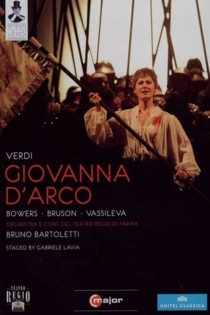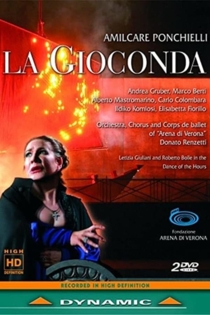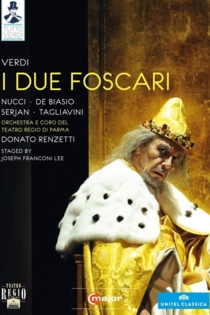
Tiziano Mancini
2021Maometto secondo
Pier Luigi Pizzi, Tiziano Mancini
Lorenzo Regazzo, Federico Lepre
Maometto II (or Maometto secondo) is an 1820 opera in two acts by Gioachino Rossini to an Italian libretto by Cesare della Valle. Set in the 1470s during a time of war between the Turks and Venetians, the work was commissioned by the Teatro di San Carlo in Naples. Della Valle based his libretto on his earlier play Anna Erizo. The name of the title character, Maometto II, refers to the real-life Ottoman Sultan and conqueror of Constantinople Mehmed II, who lived from 1432 to 1481.
Maometto secondo

Edgar
Tiziano Mancini
Marco Vratogna
Puccini’s operas are among the most beloved and best-known works in the classical repertoire, but Edgar may be unknown even to aficionados, at least as it is presented here. This original four-act version of Edgar, first performed in 1889, was believed lost for over a century when Puccini’s granddaughter Simonetta discovered the score fully intact in 2008. In addition to the third act’s funeral music, which Arturo Toscanini conducted at Puccini’s funeral in 1924, listeners may recognize the duet from the now-restored fourth act, cut by Puccini in subsequent revisions of the work: it bears more than a passing similarity to the third-act duet in Tosca.
Puccini: Edgar (Teatro Regio di Torino)
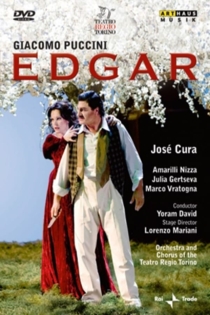
Madama Butterfly
Stefano Monti, Tiziano Mancini
Daniela Dessì, Fabio Armiliato
Japan, early twentieth century. U.S. Navy Lieutenant B.F. Pinkerton inspects the house he has leased from a marriage broker. The broker, Goro, has procured him three servants and a geisha wife, Cio-Cio-San, known as Madama Butterfly. He is enchanted with the fragile Cio-Cio-San. Cio-Cio-San is heard in the distance joyously singing of her wedding. In a quiet moment, Cio-Cio-San shows her bridegroom her few earthly treasures and tells him of her intention to embrace his Christian faith. The Imperial Commissioner performs the wedding ceremony, and the guests toast the couple. The celebration is interrupted by Cio-Cio-San's uncle, a Buddhist priest, who bursts in, cursing the girl for having renounced her ancestors' religion. Alone with Cio-Cio-San in the moonlit garden, her husband dries her tears, and she joins him in singing of their love.
Madama Butterfly
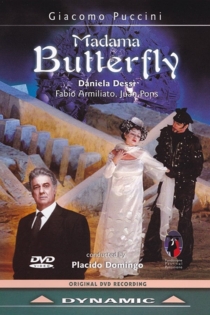
Wozzeck
William Kentridge, Tiziano Mancini
Matthias Goerne, John Daszak
A study of a man's physical and mental limitations. In the 24 quite harsh and grueling fragments of the unfinished drama, a body and a mind are tested as far as they can be pushed before their owner goes over the edge. Is there just one thing that proves to be too much for Franz Woyzeck, or is it an accumulation of miseries and torments of a wretched existence? Woyzeck is perhaps not so much a bleak account of how miserable life can be as how much strength is required to deal with the daily vicissitudes of life and how delicate and fragile a balance the human psyche rests on.
Wozzeck
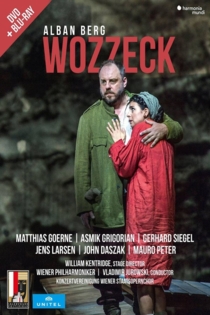
Attila
Pierfrancesco Maestrini, Tiziano Mancini
Giovanni Battista Parodi, Sebastian Catana
Part of Tutto Verdi series - Attila (2010) Parma. 'Attila' is an opera in a prologue and three acts by Giuseppe Verdi to an Italian libretto by Temistocle Solera, based on the 1809 play 'Attila, König der Hunnen' ('Attila, King of the Huns') by Zacharias Werner. The opera received its first performance at La Fenice in Venice on 17 March 1846.
Attila
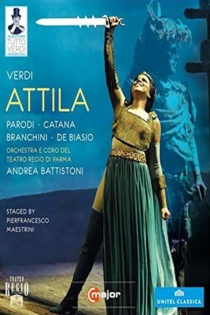
Nabucco
Tiziano Mancini
Leo Nucci, Bruno Ribiero
Part of Tutto Verdi series - Nabucco (2009) Parma. NABUCCO was Verdi’s third work for the stage and proved his first great success when performed in 1842. It deals with the Hebrew’s attempts to break free from the yoke of their Babylonian oppressors and is nowadays numbered among Verdi’s most popular works, not least on account of its famous Chorus of Hebrew Slaves, which has one of the best-loved melodies in the whole history of opera.
Nabucco
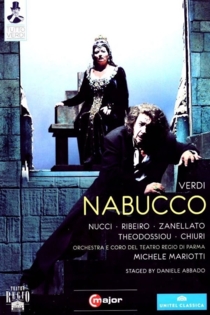
Un ballo in maschera
Pier Luigi Samaritani, Tiziano Mancini
Francesco Meli, Vladimir Stoyanov
Part of Tutto Verdi series - Un ballo in maschera (2011) Parma. Based on a Scribe libretto and begun as 'Gustavo III' set in Sweden, it became 'Una vendetta in dominò' set in Germany, and finally 'Un ballo', set not in Sweden but in Boston, Massachusetts during the colonial era. These changes were caused by a combination of censorship regulations in both Naples and Rome, as well as by the political situation in France in January 1858.
Un ballo in maschera
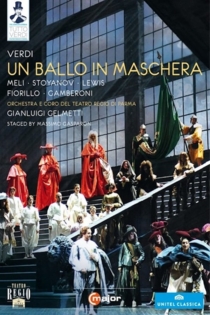
Don Carlo
Joseph Franconi Lee, Tiziano Mancini
Giacomo Prestia, Mario Malagnini
C Majors Tutto Verdi project comes to one of Verdis most popular operas: Don Carlo. Based on Schiller's play of the same name, Don Carlos was written for the Paris Opéra in 1865-66 in the tradition of a French grand opera. Repeatedly revised and performed in Italian as Don Carlo, the opera is seen here in the version that Verdi prepared for Modena in 1886. In many respects, this is Verdi's most ambitious and most forward-looking work.
Don Carlo
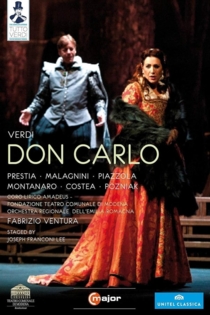
La Traviata
Karl-Ernst Herrmann, Ursel Herrmann
Svetla Vassileva, Gianluca Floris
Part of Tutto Verdi series - La Traviata (2007) Parma. 'La traviata' ('The Fallen Woman') is an opera in three acts by Giuseppe Verdi set to an Italian libretto by Francesco Maria Piave. It is based on 'La dame aux Camélias' (1852), a play adapted from the novel by Alexandre Dumas, fils. The opera was originally titled 'Violetta', after the main character. It was first performed on 6 March 1853 at the La Fenice opera house in Venice. Piave and Verdi wanted to follow Dumas in giving the opera a contemporary setting, but the authorities at La Fenice insisted that it be set in the past, "c. 1700". It was not until the 1880s that the composer and librettist's original wishes were carried out and "realistic" productions were staged.
Verdi: La Traviata (Teatro Regio di Parma)
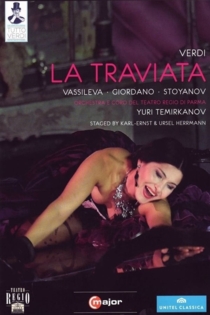
Simon Boccanegra
Marina Bianchi, Giorgio Gallione
Leo Nucci, Roberto Scandiuzzi
Part of Tutto Verdi series - Simon Boccanegra (2010) Parma. Revised version (1881). 'Simon Boccanegra' is an opera with a prologue and three acts by Giuseppe Verdi to an Italian libretto by Francesco Maria Piave, based on the play 'Simón Bocanegra' (1843) by Antonio García Gutiérrez, whose play 'El trovador' had been the basis for Verdi's 1853 opera, 'Il trovatore'. Simon Boccanegra was first performed at Teatro La Fenice in Venice on 12 March 1857
Simon Boccanegra
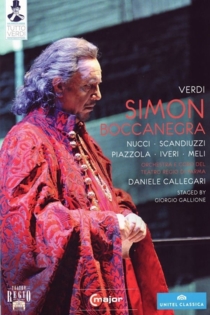
Il corsaro
Tiziano Mancini, Lamberto Puggelli
Bruno Ribeiro, Andrea Papi
The caption on the DVD sleeve reads “This Is how Verdi should be played!” and I could not agree more. The trio of principals: Ribeiro, Lungu, and Dalla Benetta , offer youthful exhuberance and intensity, good looks and glorious voices. The rest of the cast is equally good. Superb conductor, traditional production, great staging. Anf of course, Verdi’s exquisite music. It has renovated my faith in the totality of the Verdi canon, not only its most performed titles.
Il corsaro
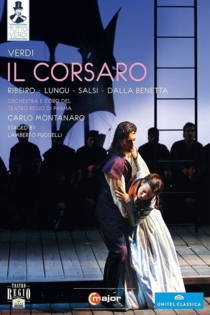
La forza del destino
Stefano Poda, Tiziano Mancini
Aquiles Machado, Dimitra Theodossiou
Director Stefano Poda set the action in the mid 19th century. There’s not a piece of furniture in the whole show. Just a lot of slabs which change position as the opera progresses. There were also a lot of non-singing characters in strange poses who popped up here and there. This sort of staging is not the usual for the Parma house which typically stays close to the traditional. There’s nothing wrong with the staging that a first rate musical effort couldn’t overcome. But that effort was not forthcoming.
La forza del destino
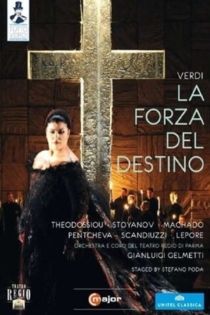
I Lombardi alla prima crociata
Tiziano Mancini, Lamberto Puggelli
Francesco Meli, Dimitra Theodossiou
I Lombardi alla prima crociata (The Lombards on the First Crusade) was Verdi’s fourth opera and received its first performance at La Scala, Milan, in February 1843. The grandiloquent subject matter is fleshed-out with broad-brushed musical and dramatic effects and lavish choral scenes created a correspondingly impressive impact. A great success in Milan, it spread to the rest of Europe within a matter of only a few years.
I Lombardi alla prima crociata
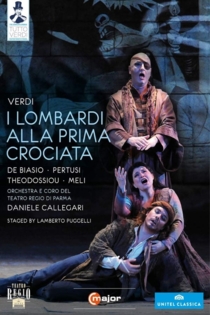
Giovanna d'Arco
Gabriele Lavia, Tiziano Mancini
Svetla Vassileva, Evan Bowers
This work predates Thchaikowsly’s for almost 4 years, and it is base don the Schiller play I have previously criticized for its lack of historical accuracy. It is essentially focused on three major voices, soprano, tenor and baritone, with a basso to spice it up. New Yorker Evan Bowers may not be a matinee idol, but he sails into the role with a bright, focused lyrico spinto tenor voice. Renato Bruson was 72 years old in 2008, when he took this role (first sung by him in1989) and it shows, with quite a wobble on many passages; yet his voice commands the stage and rises majestically in the ensembles. And then, Bulgarian Svetla Vassileva, who is not burned at the stake, as in “Maid”, but dies heroically in battle.
Giovanna d'Arco
